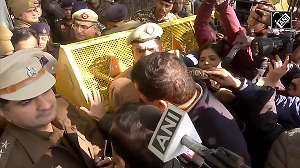The two-year-old baby has been put on life-support system. Doctors, however, are finding it hard to assess the long-term repercussions of her head injuries. Priyanka reports.
On bed number six at the AIIMS trauma center's intensive care unit, baby Falak's struggle for life continues. After suffering severe head injuries and having undergone three major surgeries, it is now becoming hard for doctors to ascertain how the injuries will affect her ability to perform daily functions on her own later.
Two-year-old baby Falak was brought to AIIMS hospital on January 18 by a sixteen-year-old, who claimed to be her mother. The baby had severe injuries on the head, both her arms were fractured and there were multiple wounds on her body that appeared like human bite marks.
She has been in the ICU since then. Dr Deepak Aggarwal, an associate professor of neurosurgery, is in charge of managing the team that is looking after baby Falak. He is being assisted by a team of five consultants from the teaching faculty and ten resident doctors. The intensive care unit at the AIIMS trauma center has twenty patients, with about eighty nurses to look after the patients. The nurses work in three shifts of eight hours each. "There is always a nurse to look after baby Falak," said Dr Aggarwal.
Soon after the heart-wrenching story of baby Falak was telecast, doctors claimed that many television channels bared the face of the child instead of blurring it.
"Her face should have been blurred, but none of the news channels took the necessary step. We were shocked to see it," the doctor said. A notice was served by the women's commission, following which baby Falak is out of bounds for visitors.
Even though doctors at the AIIMS trauma center have performed three major surgeries on baby Falak, her medical condition has ceased to improve. Baby Falak is now in a coma and the doctors have put her on ventilator.
The doctors are also finding it hard to assess the long-term repercussions of her head injuries.
"It is very difficult to say," Dr Aggarwal said. "Children are definitely at a higher risk. In this case, the reserves of nutrition and the level of inner immunity of baby Falak are almost over."
"And even though we are giving her nutrition, the immunity of the body is so low that she is more likely to contract infections in the chest, blood and the brain. In fact, she is suffering from a severe infection," Dr Aggarwal told Rediff.com.
The doctor said that baby Falak has a 30 to 40 percent chance of survival.
"About 30 percent of all patients with severe head injuries who come to a hospital do not survive. Another 30 to 40 percent do live and are in a vegetative state all their lives. They are dependent on their families to take care of them. Only a remaining 30 percent are able to go back to walking and talking," Dr Aggarwal added. "And there is no way of telling how long it will take," he said.
Dr Aggarwal said, "Those patients who live after such injuries show a non-existent or a very slim chance of having average intelligence. They tend to react poorly to cognitive functions." Apart from the shortcomings in performing cognitive functions, patients might also have to deal with motor impairments.
"Baby Falak is severely hurt on the left side of her body, which might make the right part of her body weak," the doctor said.
Dr. Aggarwal, however added, "Paradoxically, the fact that baby Falak is so young might also save her."
"Young children have plastic brains, and the part of the brain which is not injured and hurt might take over the part which is severely hurt," he said.
"I sometimes feel that we are creating an army of people who are a burden to the society, as they would be dependent on others and their family members to take care of them all their lives."
"But we are not God, and can only do what we do best," said a pensive Dr Aggarwal.
"Even if one in a 100 or 200 of our patients comes back to us and tell that they are able to lead a normal life that alone gives us immense satisfaction and the motivation to carry on," he added.







 © 2025 Rediff.com -
© 2025 Rediff.com -